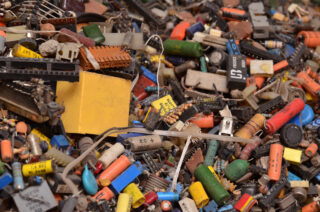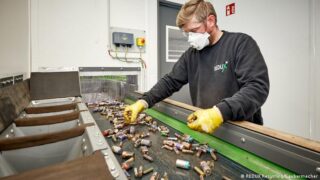Battery
| Problems and Particular Challenges with Recycling this item | Improperly disposed batteries contribute to water and air pollution. When depleted batteries are tossed into the trash, they end up in landfills where they decay and leak. As batteries corrode, their chemicals soak into soil and contaminate groundwater and surface water.
Improperly disposed batteries negatively affect human health. Exposing the environment to lead and strong corrosive acids found in batteries can cause burns and dangers to our eyes and skin. |
 |
|
| Procedures, Capacities, and Facilities for Disposing | The battery is broken apart in a hammer mill, a machine that breaks the battery into pieces.
The broken battery pieces go into a vat, where the lead and heavy materials fall to the bottom while the plastic rises to the top. At this point, the polypropylene pieces are scooped away and the liquids are drawn off, leaving the lead and heavy metals. Each of the materials then begins its own recycling journey. |
 |
|
| E Waste Partners for Processing Safely and Successfully | Battery Council International (BCI) 330 North Wabash Avenue, Suite 2000 | Chicago, Illinois 60611 Phone: +1.312.245.1074 info@batterycouncil.orgRetriev Technologies info@retrievtech.com Ohio: (740) 653-6290 Trail, BC: (877) 468-6926 https://www.retrievtech.com/contactus NAWATechnologies Akkuser Oy Lithion |
